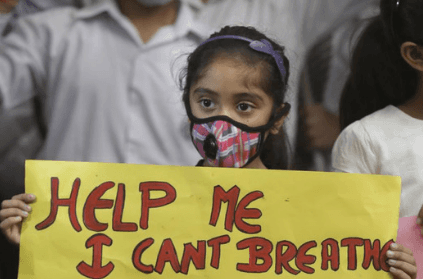OVER 90% OF CHILDREN WORLDWIDE ARE BREATHING TOXIC AIR EVERY DAY; INDIA TOPS LIST OF POLLUTION-INDUCED DEATHS: WHO
Home > News Shots > WorldBy Behindwoods News Bureau | Oct 30, 2018 09:54 AM

The menace of air pollution is having a massive impact on the world. The toxic air is taking a toll on billions of children around the world, affecting their intelligence, leading to countless loss of lives.
According to a report by the World Health Organisation (WHO, more than 90% of the world's young population - 1.8 billion children - are breathing toxic air every day. As per the report, India tops the list of air pollution-induced deaths in children below 5 years of age, with over 2.5 lakh children in the country dying in 2016.
Titled 'Air pollution and child health: Prescribing clean air', the report sought to examine the impact of both ambient (outside) and household air pollution on the health of children, particularly in low and middle-income countries.
Household air pollution, the result of burning fossil fuels like coal indoors, led to the death of 67,000 children below the age of five in India, while outdoor air pollution such as that caused by vehicular pollution led to nearly 61,000 deaths among children below the age of five in 2016 in India, said the study.
Of all the countries in the survey, India topped the list of highest premature deaths among children under the age of five due to outdoor air pollution in 2016 and the second highest due to exposure to household air pollution, followed by Nigeria.
“Polluted air is poisoning millions of children and ruining their lives. This is inexcusable – every child should be able to breathe clean air so they can grow and fulfil their potential,” said Dr Tedros Adhanom, WHO Director General.
"WHO is supporting implementation of health-wise policy measures like accelerating the switch to clean cooking and heating fuels and technologies, promoting the use of cleaner transport, energy-efficient housing and urban planning. We are preparing the ground for low emission power generation, cleaner, safer industrial technologies and better municipal waste management," said Dr Maria Neira, Director, Department of Public Health, Environmental and Social Determinants of Health at WHO
